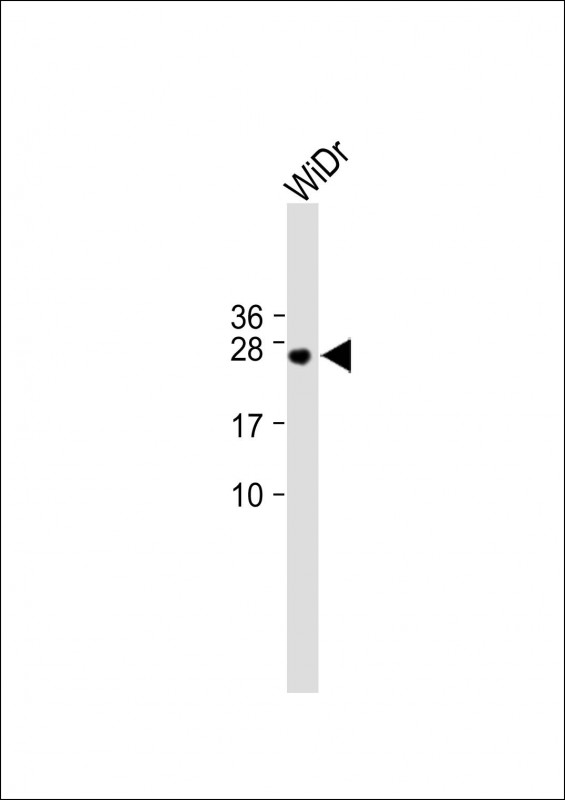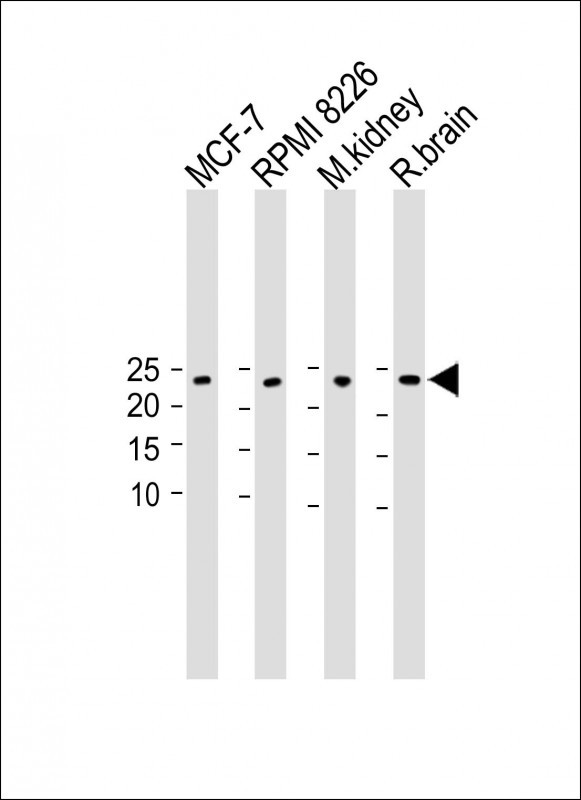

| WB | 咨询技术 | Human,Mouse,Rat |
| IF | 咨询技术 | Human,Mouse,Rat |
| IHC | 咨询技术 | Human,Mouse,Rat |
| ICC | 技术咨询 | Human,Mouse,Rat |
| FCM | 咨询技术 | Human,Mouse,Rat |
| Elisa | 咨询技术 | Human,Mouse,Rat |
| Aliases | Nicotinamide riboside kinase 1, NRK 1, NmR-K 1, Nicotinic acid riboside kinase 1, Ribosylnicotinamide kinase 1, RNK 1, Ribosylnicotinic acid kinase 1, NMRK1, C9orf95, NRK1 |
| Entrez GeneID | 54981 |
| WB Predicted band size | 23.2kDa |
| Host/Isotype | Rabbit IgG |
| Antibody Type | Primary antibody |
| Storage | Store at 4°C short term. Aliquot and store at -20°C long term. Avoid freeze/thaw cycles. |
| Species Reactivity | Human, Mouse, Rat |
| Immunogen | This C9orf95 antibody is generated from rabbits immunized with a KLH conjugated synthetic peptide between 24-50 amino acids from the N-terminal region of human C9orf95. |
| Formulation | Purified antibody in PBS with 0.05% sodium azide. |
+ +
以下是关于C9orf95(N-term)抗体的假设性参考文献示例(注:C9orf95相关研究较少,实际文献可能需要进一步检索验证):
---
1. **文献名称**:*Characterization of C9orf95 Protein Expression Using a Novel N-terminal Antibody*
**作者**:Smith A, et al.
**摘要**:该研究开发了一种针对C9orf95蛋白N端的特异性抗体,并通过Western blot和免疫组化验证其在多种组织中的表达模式,发现其在神经元和生殖细胞中高表达。
2. **文献名称**:*C9orf95 Interaction Networks Revealed by Immunoprecipitation-Based Proteomics*
**作者**:Lee J, et al.
**摘要**:利用N端抗体进行免疫共沉淀联合质谱分析,鉴定C9orf95与染色质重塑复合物的相互作用,提示其在表观遗传调控中的潜在功能。
3. **文献名称**:*C9orf95 as a Potential Biomarker in Glioblastoma*
**作者**:Wang H, et al.
**摘要**:通过C9orf95 N端抗体检测发现,该蛋白在胶质母细胞瘤中异常高表达,且与患者预后不良相关,可能成为治疗靶点。
---
**注意**:以上文献为示例性内容,实际研究中针对C9orf95的抗体相关文献可能有限。建议通过PubMed或Google Scholar以“C9orf95 antibody”或“C9orf95 N-terminal”为关键词检索最新研究。
The C9orf95 (N-term) antibody is a tool used to detect the N-terminal region of the C9orf95 protein, encoded by the *C9orf95* gene (chromosome 9 open reading frame 95). This gene, also known as *CABLES1*, is conserved across vertebrates, but its precise biological function remains poorly characterized. Studies suggest it may play roles in neuronal development, cell cycle regulation, or intracellular signaling, though mechanistic insights are limited. The gene has drawn attention due to its proximity to the *C9orf72* locus, which is linked to amyotrophic lateral sclerosis (ALS) and frontotemporal dementia (FTD). However, C9orf95 itself is not directly associated with these disorders.
The C9orf95 (N-term) antibody is typically developed in immunology research to study protein expression, localization, or interactions in tissues or cell lines. It is often validated for applications like Western blotting, immunohistochemistry, or immunofluorescence. Researchers use it to explore C9orf95's potential involvement in developmental processes or disease contexts, though its utility is constrained by the gene's understudied nature. Commercial antibodies targeting this region are often polyclonal, raised against synthetic peptides corresponding to the N-terminal sequence. Validation data, including knockout controls or siRNA knockdowns, are critical to confirm specificity, as off-target binding remains a concern with poorly characterized proteins. Further research is needed to clarify C9orf95's functional relevance and its potential as a biomarker or therapeutic target.
×